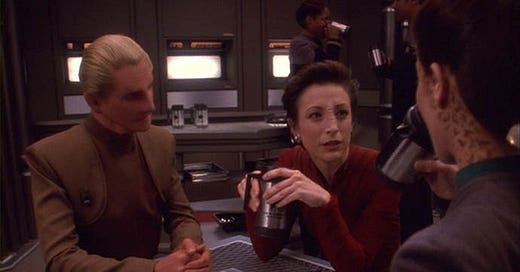Pablo Hidalgo tweeted something a couple months ago that confused me at first:
This seemed like weird nit to pick since most characters in Star Wars speak English. Then he clarified this was a personal crusade to stay consistent with the measurement of the Death Star’s exhaust port (“only two meters wide”) and George Lucas’s love of digital photography. Now I vow to never utter the word “footage” again. For George.
Metric system aside, Star Wars does have a weird relationship with our vocabulary. On the one hand, it’s a fantasy franchise in space—more concerned with wizards than technical jargon. Harrison Ford still complains he had to say “It takes a few minutes for the navicomputer to calculate the coordinates.” (The actual line, of course, is “It'll take a few moments to get the coordinates from the navicomputer.” And now, for some reason, I’m imagining Harrison Ford punching me in the face.) But honestly a little navicomptuer talk is nothing compared to the stuff the engineers have to say on Star Trek:
On the other hand, Star Trek takes place in our universe. So the writers get more leeway not just with words, but specific cultural references. Captain Benjamin Sisko rubs a baseball when the Dominion War isn’t going well. Jean-Luc Picard retires to his family’s vineyard in France. And several of the characters are hopelessly addicted to coffee.
Which brings me to the subject line of today’s newsletter. Here are three litmus-test lines when it comes to cultural allusions in Star Wars:
“Then I’ll see you in hell!” —Han Solo, The Empire Strikes Back
“It's called hot chocolate.” —Luke Skywalker, Heir to the Empire
“You think, what? I'm gonna walk out with a laser sword and face down the whole First Order?” —Luke Skywalker, The Last Jedi
The first one doesn’t bother me. “Hell” doesn’t refer to one religion in English. It’s just the generic word for a bad place in the afterlife. It makes sense that in a massive galaxy, there would be varied religions with different-but-similar ideas about a realm you go to after you die. And in such a context, “I’ll see you in hell” could emerge as an idiom.
No. 3 is also fine. “Laser sword” is kind of an in-joke here. George Lucas often calls lightsabers that to avoid sounding self-serious, and young Anakin asks Qui-Gon about his laser sword in The Phantom Menace. You’d think people would give Rian Johnson credit for this deep-cut prequels callback, instead of making it an example of how he “ruined” Luke…
That leaves only hot chocolate, and our old pal Timothy Zahn. It’s funny: Zahn coined Questis—the name of this very newsletter—to avoid saying tablet “tablet” or “iPad” or maybe “Ch’i’Pad” in his Chiss trilogy. But he started his Star Wars novel career with a jarring borrowed word. Chocolate implies a specific plant that has evolved to grow on our little planet. I don’t know why this bothers me so much, since Star Wars also posits that this galaxy far, far away also has evolved human beings, some of whom look exactly like Earth actors Mark Hamill and Harrison Ford.
Or are Mark Hamill and Harrison Ford just actors representing the the alien characters of Luke Skywalker and Han Solo in a way that our minds can most readily accept? And they’re speaking English just so we can understand them? Perhaps just like hell signifies the idea of a negative experience in the afterlife, hot chocolate is the proximate translation for “hot and sweet beverage.”
But Zahn goes out of his way to say Lando introduced hot chocolate to Luke—implying it’s a specific drink from an obscure corner of the galaxy. If it had just said “Luke sipped his hot chocolate,” I’d accept it as a generic stand-in for a similar drink. But what are we really saying here? Lando’s been to Earth? And since Star Wars takes place a long time ago, Lando’s been to Earth as it was centuries ago, when the ancient Mayans drank hot chocolate? Was Chichen Itza built as a dock for the Millennium Falcon? Is that what you’re trying to tell us, Tim: Aliens did build pyramids?!
Tim????






This reminds me how in the LOTR appendices Tolkien says Sam's real name is Banazîr Galbasi, and he's conveniently localized it into something resembling English for us. To which I say, maybe it's time to step away from the writing desk for a minute